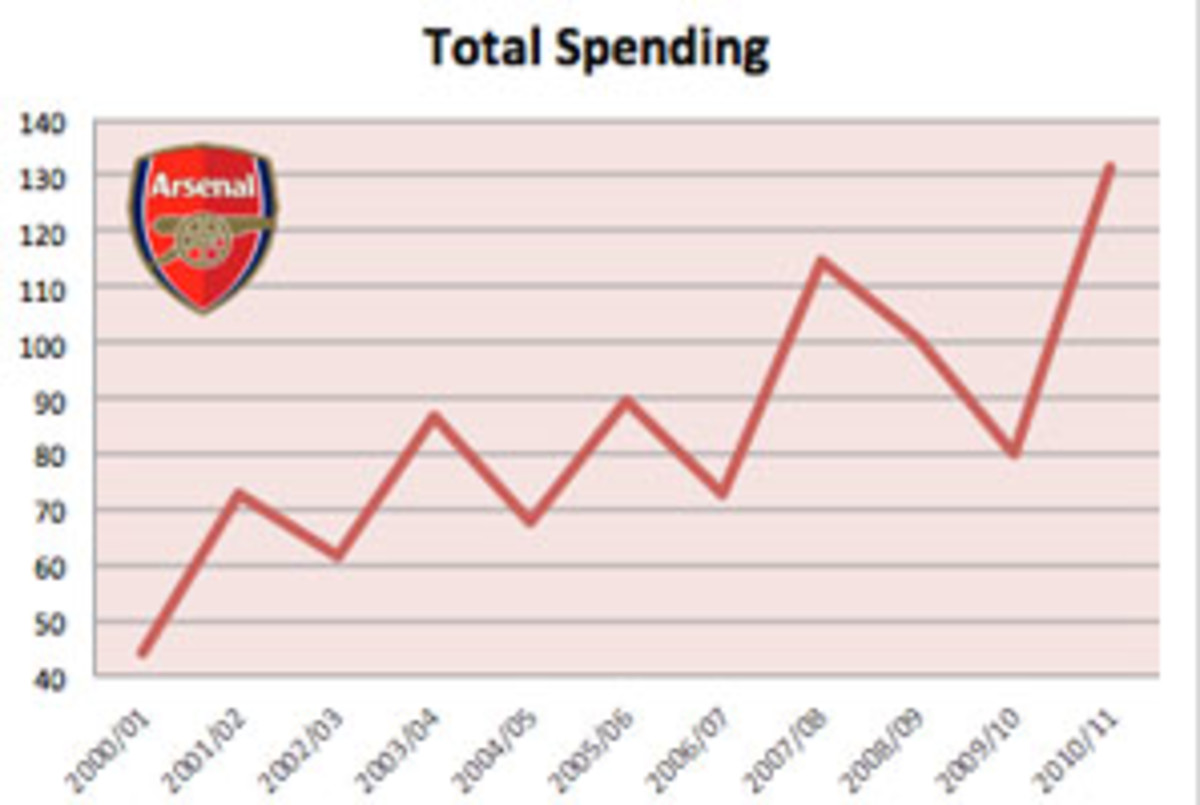Is more spending the answer to Arsenal's problems?
It's like a bad song you can't get out of your head. It loops endlessly with each loss and closed transfer window as fans and pundits alike fall back on the same tired refrain: Arsenal needs to spend some money.
It's the easy conclusion to reach. Stars and captains have marched out the door while few comparable players have been brought in as replacements. For years, whispers of Arsene Wenger's mythical "war chest" have floated around, waiting for the day when the thrifty Frenchman will go back on his ways and blow it all on an earth-shattering transfer.
But the truth is net player spending has increased, and almost exactly as promised. Since the move from Highbury to the Emirates the club has spent, on average, £31.65 million more per year on a combination of wages and transfers.
A mere £30 million clearly isn't enough to top the league table in this time of oil barons and oligarchs. As I write these words, Chelsea owner Roman Abramovich has probably decided to drop another £50 million on his new favorite player, while Manchester City owner Sheikh Mansour set himself on breaking the English transfer record. Twice.
But Arsenal is spending more money, trailing Manchester United in total player spending by just £30 million. A gap, sure, but not an insurmountable one. Who knew?
Problem is, you wouldn't know unless you pay attention to the wage bill.
From the 2005-06 season on, that's where the majority of the £30 million has gone. Arsenal's average spending on players' wages since the move to the Emirates is £42.43 million more than it was before the move, constituting a 71 percent increase.
Rising wages in itself isn't anything unique to Arsenal. Every club in the English Premier League over the last 12 years, without exception, has seen an increase in wages. But United, Chelsea and City are the only teams to have increased theirs more than the Gunners.
What is unique to Arsenal among top clubs is that bigger paychecks coincide with gradually decreasing net transfer spending, averaging £12.7 million less in the last seven seasons than the six before the Emirates move.
United's net transfers have dropped over the same period as well, but only due to the one-time sale of Cristiano Ronaldo in the 2009 season. Without that one outlier, the red side of Manchester has seen a slight increase in transfer spending, while the more than 10 times increase in transfers since 2005 on the blue side of the city is almost comical (in a terrifying, make you want to cry sort of way).
The only fans to witness similar spending trends to Arsenal are at Newcastle and Blackburn, the former due to relegation and the latter to a fire sale of players as Rovers (unsuccessfully) fought to stay afloat in the top flight.
It's the combination of falling transfers and rising wages that has backed Arsenal into a corner. Perpetually mid-table clubs like Everton, Fulham and, dare I say, Tottenham might be looked to as examples of "normal" spending. They always manage to survive, season after season, and all have added an increase in transfer spending, however slight, to increasing wages. Ideally, they invest in higher quality players who justify higher salaries.
More money spent on lesser quality, as Arsenal's finances seem to suggest, isn't a strategy that promotes a competitive team. Consider Manuel Almunia. The sleepy eyed Spaniard admitted after his departure that he should have left sooner rather than ride the bench for a season or two, but the generous paycheck he received, whether he performed well or not, was too tempting to leave behind.
Blondie may be gone, but there is still plenty of dead weight there to be cut and cash to be freed up. Perhaps it's time fans replaced the popular "Spend some [expletive] money" chant with something a bit more appropriate. But "Cut the wage bill and spend transfer funds more effectively" never did have the same ring to it.\n






